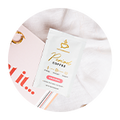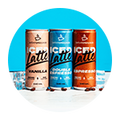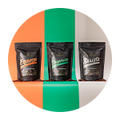Stevia. What’s with all the hate?!
Regarding sugar substitutes, stevia stands out as a unique option. Unlike many artificial sweeteners, this additive is derived from natural sources and boasts a wealth of beneficial substances for our bodies. Scientific research has shown that regular consumption can enhance digestive functions, strengthen our immune system, and even aid in preventing the accumulation of body fat.But what exactly is this sweetener? What makes it so beneficial? Is it suitable for everyone? Let's dig into the details to find those answers.
WHAT IS STEVIA?
Also known as Stevia rebaudiana or honey grass, this remarkable medicinal plant has found a place in medicine, cooking, and cosmetology. It wasn't until the early 20th century that French scientists succeeded in extracting stevioside and rebaudioside from Stevia plants and discovered that they are up to 300 times sweeter than sugar but do not significantly affect blood glucose levels, making them a viable sugar substitute for individuals with diabetes.
However, the inhabitants of South America first discovered its beneficial properties as far back as 1899. The Guarani Indians, who have been using it for centuries, recognised its sweetening capabilities and viewed it as a remedy for heartburn and gastrointestinal disorders. Furthermore, they considered it to possess potent healing powers that could enhance overall health.
Now, we know that stevia is a powerhouse of beneficial substances. It contains over a hundred compounds contributing to its medicinal and nutritional value, including:
-
Vitamin E (tocopherol) for immunity;
-
B vitamins for energy;
-
Niacin (vitamin PP) for cholesterol control;
-
Vitamin D (calciferol) for bone and joint health;
-
Vitamin A (retinol) for immune system support;
-
Vitamin C (ascorbic acid) for healthy skin, blood vessels, and bones;
-
Essential oils for improved mood and focus;
-
Pectins for gut health;
-
Tannins for free-radical neutralisation;
-
Linoleic acid for heart health;
-
Chlorogenic acid for lipid metabolism;
-
Arachidonic acid for brain health;
-
Flavonoids for oxidative damage protection;
-
Polysaccharides for anticoagulant effect;
-
Calcium for heart and muscle health;
-
Magnesium for healthy nerves;
-
Selenium for hair and nail health;
-
Copper for healthy nervous and immune systems;
This rich and diverse composition of nutrients makes honey grass a popular choice as a sugar substitute in producing various healthy and dietary foods, providing a satisfyingly sweet taste without the calories and adverse effects of sugar.
Some studies also suggest it may have antioxidant, anti-inflammatory, and antimicrobial properties and aid in weight management and blood pressure control. However, additional research is required to comprehensively understand and verify these potential health benefits.
HEALTH BENEFITS ASSOCIATED WITH STEVIA
In recent years, scientific research on this additive's health benefits has revealed several results. Here are some notable benefits:
Hypertension management.
There is evidence that honey grass is beneficial for people with hypertension. It can improve blood flow, reduce fluid retention, and lower blood pressure while also removing excess sodium from the body to prevent fluid retention.
Antioxidant properties.
It exhibits strong antioxidant properties crucial in combating free radicals and oxidative stress. By neutralising these harmful molecules, honey grass may act as a preventive measure against various diseases, including certain types of cancer. For example, the flavonoid kaempferol in stevia leaves has been linked explicitly to preventing pancreatic cancer.
Nutritional support.
Stevia sweetener contains various vitamins and minerals that comprehensively support the body's organs and systems. These nutrients improve overall health and provide multiple positive effects. The extract contains water-soluble vitamins like C and B-complex, while the leaves have folic acid.
Muscle and joint pain relief.
This sweetener can alleviate muscle and joint pain, benefiting individuals with arthritis, fibromyalgia, and related conditions. Since sugar can aggravate inflammation, substitutes allow people to continue enjoying sweet desserts and beverages despite their discomfort.
Metabolism improvement.
Consumption of this sugar substitute can improve metabolic function, aiding in weight management and overall energy balance. Also, the body does not react to the extract as it does with sugar, so it does not produce any insulin, and the compounds pass unchanged into the colon, where hydrolysis removes the glycoside.
Intestinal microflora balance.
The composition of Stevia promotes a healthy balance of intestinal microflora, which is crucial for proper digestion and nutrient absorption. Altering the gut bacteria may also correct glucose intolerance from fat-rich diets. Additionally, it may have a prebiotic effect of stimulating the growth of certain bacteria to increase resistance against pathogens.Normalisation of pH and cholesterol levels.
Several studies have discovered that it regulates pH levels and keeps cholesterol levels healthy. It's shown that consuming 20 mL of leaf extract daily may lower bad cholesterol (LDL) and triglycerides and increase good cholesterol (HDL) without adverse side effects.Hair and nail strength.
The nutrients present in the extract can strengthen hair and nail structures, promoting their health and resilience. The breakdown of sugar can affect the collagen in hair and nails, so alternatives help you avoid brittleness.Reduced fatigue.
Reportedly, moderate consumption reduces fatigue during physical exertion and mental or intellectual stress periods. It also helps you stay full on lower calories so you can continue your activities for extended periods and take fewer breaks in between.Support for alcohol and smoking cessation.
Some studies suggest that stevia may help reduce cravings for alcohol and smoking, potentially aiding individuals to quit or reduce consumption. People also begin craving sweet things when trying to quit smoking or drinking, so a healthy alternative is better than actual sugar when replacing these oral fixations.Detoxification.
It can assist in eliminating toxins and waste products from the body, contributing to overall detoxification and improved organ function. The detoxification happens mainly thanks to its prebiotic effect on gut bacteria which help push out the toxins from your gastrointestinal system or GI.Cardiovascular health support.
It may strengthen blood vessels and the heart muscle, potentially reducing the risk of cardiovascular diseases. It can boost cardiovascular health by lowering bad cholesterol levels, which places you at risk of heart disease.Boosting skin health.
The consumption of stevia can lead to improved skin health, including reducing rashes and inflammation. It also has antibacterial properties that help treat skin conditions, but only when applied topically.Moreover, regular consumption of honey grass may result in improved oral health. Individuals have reported fewer instances of tooth decay and periodontal disease in regions where they commonly consume honey grass. The natural compounds found in this plant help clean teeth, remove impurities, and strengthen tooth enamel.
Although this sugar substitute offers a variety of health benefits, individual responses may differ. It is always wise to ask your doctor before making significant dietary changes or introducing new substances into your routine.
HOW IS A STEVIA SWEETENER PRODUCED?
Honey grass extracts offer a natural and low-calorie alternative to sugar, making them a popular choice for people seeking to reduce sugar consumption.
To provide a sweetening solution for different foods and beverages, the steviol glycosides are carefully extracted and purified during production. It's a complicated process involving several steps:
Cultivation:
Stevia rebaudiana is cultivated and grown in suitable climates, often in South America and Asia. However, these plants are extremely adaptable to a wide range of environmental conditions and can grow in various soil types, from sandy loam to clay, as long as it is well-drained and fertile.Extraction:
Once the plants reach maturity, the leaves are harvested, dried, and then subjected to various extraction methods to isolate the steviol glycosides. A combination of water and ethanol is the most common method of extraction.Purification:
The resulting crude extract contains a mixture of steviol glycosides and other plant compounds. To remove impurities and elements contributing to bitterness, the extract undergoes purification, resulting in a high-quality Stevia sweetener. This purification process helps improve the taste profile of the sweetener.Isolation of steviol glycosides:
The purified extract is further processed to isolate specific steviol glycosides, such as stevioside and rebaudioside A (reb A), most commonly used in sweeteners. Isolation can involve crystallisation, filtration, or chromatography techniques to separate and concentrate the desired steviol glycosides.Bioconversion and fermentation (optional):
In some cases, bioconversion and fermentation processes are utilised to produce specific steviol glycosides with improved taste profiles. These processes involve using enzymes or microorganisms to convert certain compounds within the stevia extract into different, less bitter steviol glycosides, such as rebaudioside M (reb M).Blending and formulation:
Once the desired steviol glycosides are isolated, they are typically blended and formulated with natural flavours, bulking agents, and other additives to create the final sweetening products. Blending helps enhance the taste and texture of the sweetener and makes it suitable for various applications.As different manufacturers use different production processes, their additives may have distinct flavour profiles and compositions. In Beforeyouspeak blends, we use the best of these sweeteners, aiming to achieve a product that closely mimics the taste of sugar while minimising any bitter aftertaste.
STEVIA VS SUGAR - WHICH IS BETTER?
The debate between these two sweeteners revolves around various aspects that can impact our health and well-being.
Since honey grass has no calories, it makes a great choice for those who are conscious of their weight or trying to reduce overall calorie intake. In contrast, sugar is calorie-dense, and its excessive consumption can cause weight gain. So, by choosing this plant sweetener as a sugar substitute, you can enjoy sweetness without the guilt of adding extra calories to your diet.
Stevia also has a minimal impact on blood sugar levels as compared to sugar. As sugar rapidly elevates blood glucose levels, honey grass does not, making it a valuable option for those with diabetes or monitoring their blood sugar.
In addition, honey grass has a lack of contribution to tooth decay. Sugar is notorious for promoting the growth of harmful bacteria in the mouth, leading to cavities and dental problems. In contrast, stevia does not ferment in the mouth, minimising the risk of tooth decay and maintaining better dental health. This aspect is particularly beneficial for people who prioritise their oral hygiene or are susceptible to dental issues.
However, the suitability of this alternative sweetener versus sugar depends on the intended use. The former is an excellent choice for sweetening beverages, like coffee or tea, as it dissolves quickly and provides sweetness without the added calories. It can also be used in baking, although it may require adjustments to the recipe due to its concentrated sweetness. On the other hand, sugar plays a crucial role in the texture, structure, and browning of baked goods, making it a preferred option for some recipes.
So is stevia better than sugar? Ultimately, there is no definitive answer. The choice depends on individual preferences, health considerations, and intended use. Honey grass offers many advantages, like zero calories, minimal impact on blood sugar levels, and protection against tooth decay. However, sugar remains the go-to sweetener for certain culinary applications. Exploring personal taste preferences and considering health goals can help determine your better choice.
A SWEET ALTERNATIVE: WHY ISN'T EVERYONE USING STEVIA INSTEAD OF SUGAR?
With all its indisputable advantages, honey grass has one slight drawback - a licorice flavour with a bitter aftertaste. While some people enjoy that unique flavour, others may find it less satisfying or less enjoyable than the taste of sugar. The personal preference for sweetness and the tolerance for stevia flavour varies among people.
Studies on this individual sensitivity to stevia sweetener taste have gone on for decades. However, research is still underway to conclude why we all experience the taste differently. In a study published in the Journal of Chemosensory Perception, 122 participants sampled two types of extract, RebA and RebD. The findings indicated that the perceived bitterness of each sample varied greatly across subjects.
Individual taste preferences, sensitivity to sweeteners, and unpalatability caused by a bitter aftertaste have all been widely reported by individuals when trialling honey grass. Differing opinions and research-based evidence also suggest that variations in taste aversions to various food products may have a genetic basis (Simons et al. 2008).
Most people who don't enjoy stevia report a bitter taste during consumption, and a person's taste buds dictate this sensation. Someone overly sensitive to bitter flavours across all food and drink products is known as a 'Supertaster'. Being a supertaster is a genetic trait potentially caused by an increased amount of bitter-sensing taste buds in some areas of the tongue. 25% of the world's population are considered supertasters, and it impacts women at a greater rate than men.
According to Meyerhof et al. 2010, hTAS2R4 and hTAS2R14 are the specific taste receptors on the tongue that influence whether we recognise the bitter aftertaste of steviol glycosides or not. This discovery has further fueled the argument that the initial encoding of the genes for these receptors in vitro determines how we taste different substances and would, of course, explain why we are all so wildly different when it comes to enjoying particular foods.
Without going further into all the scientific mumbo jumbo beyond the studies, there is evidence that other artificial sweeteners interact with taste buds similarly to the natural stevia compound. Different taste receptors in the mouth responsible for recognising sweet and bitter tastes can simultaneously detect both. This crossover causes the bitter 'chemical' taste reported by some, even though the extract is a natural product.
This knowledge again leads to the idea that an individual's unique taste buds can cause either the sweet or bitter sensation to outweigh the other or allow them to be perceived at an equal rate. However, further study is needed to explain how and why this occurs.
Considering all this, stevia can never fully replace sugar. If you hate it, you hate it, and that's hardly changing. However, you can try to mask the flavour or invest in hypnotherapy or neuro-linguistic programming, but this is expensive, time-consuming, and generally reserved for people with severe food aversions. Nevertheless, honey grass is considered the best healthy sweetener for the moment, so it's worth trying. Plus, there is some evidence that hiding it in your favourite foods can slowly improve the acceptance of its flavour.
HOW TO USE STEVIA AS A SUGAR SUBSTITUTE?
Including stevia in your cooking and baking as a sugar substitute is an easy and health-conscious choice. However, it's important to use honey grass sparingly due to its high sweetness level - as a general rule, one teaspoon of table sugar can be replaced with just a pinch of sweetener powder. It's always better to start with a small amount and then add more sweetener if needed to achieve your desired level of sweetness.
This is one of the best sweeteners you can use in both hot and cold beverages. Whether you're sipping a cup of coffee, tea, homemade lemonade, or a refreshing smoothie, adding a pinch of powder or a few drops of the liquid extract will enhance the flavour profile. Find your preferred level of sweetness by experimenting with the amount.
You can also enhance your breakfast with stevia by sprinkling it on top of your cereal for a touch of sweetness or mixing it into unsweetened yoghurt for a flavourful and healthy treat to start your day.
Additionally, honey grass can be used in baking. But since it may alter the taste and texture of the final product, consider using sweeteners specifically formulated for baking, sweetened beverages and sauces.
Moreover, when using stevia products for cooking, replacing only half the sugar in your recipe is recommended to avoid unwanted aftertaste. Add extra liquid or bulking ingredients such as applesauce or mashed bananas to make up for the lost volume and texture. You will also need to experiment with this sugar substitute to achieve the right sweetness and texture when baking.
Sweetness preferences vary by person, so make sure you adjust the amount of sweetener according to your taste. In time, you'll discover the perfect level of sweetness and bitterness as you become more familiar with this sweetener.
IS STEVIA BETTER THAN SUGAR IN COFFEE?
Coffee enthusiasts are increasingly using honey grass as a natural sweetener to enhance their coffee and get those potential health benefits.
The main advantage of this plant sweetener is its intense sweetness with lower caloric content, so it can be used in smaller amounts than sugar, reducing the total calorie intake.
Another good reason to use it in coffee is that it dissolves easily in hot liquids. Unlike other sweeteners that may leave a residue or fail to incorporate into the coffee fully, stevia blends seamlessly, creating a consistent and sweet flavour profile. For those who prefer a little sweetness with their morning brew, this is a convenient, versatile, and healthier option.
However, it's essential to consider that it can alter the taste of coffee. While some people enjoy the flavour combination, others may find it alters the overall taste profile, resulting in a slightly different coffee experience. The sweetness's intensity can overpower the coffee's natural flavours, which may not appeal to everyone.
A simple solution - if you find a coffee with stevia too sweet, add more water or a splash of your favourite milk. Also, Beforeyouspeak offers a wide range of unsweetened options for those who enjoy coffee's pure, unadulterated taste without any added sweeteners.
IS STEVIA THE SAFEST BEVERAGE SWEETENER?
The world widely regards honey grass as one of the safest sweeteners available. Regulatory authorities such as Food Standards Australia New Zealand (FSANZ) and the Therapeutic Goods Administration (TGA) have comprehensively evaluated its safety and approved this sweetener as a food additive.
The safety assessments thoroughly examine its chemical composition, potential toxicity, and possible side effects. These inspections have consistently shown that Stevia sweetener is non-toxic and poses no major health risks when consumed in recommended amounts. As a result, it is "generally recognised as safe" (GRAS) by regulatory agencies in Australia and other countries.
DOES STEVIA HAVE ANY SIDE EFFECTS?
While it is generally considered safe for intake, there are certain contraindications and precautions to note. Here are some situations where we don't recommend using this sweetener:
Low blood pressure.
There are reports that honey grass has a potential blood pressure-lowering effect. Therefore, individuals with low blood pressure should exercise caution when using plant sweeteners, as it may further decrease blood pressure levels.Individual intolerance.
Some individuals may have an allergic or hypersensitive reaction to it, such as rash, itching, or digestive discomfort. If you experience any of these symptoms, you should discontinue its use and consult a healthcare professional.Pregnancy and lactation.
Stevia is not proven to be safe during pregnancy or breastfeeding. While moderate consumption is unlikely to cause harm, we recommend you ask a doctor before using the sweetener during these periods.Nervous disorders.
People with certain nervous disorders, such as Parkinson's, should avoid or limit the use of this additive. Several medications used to treat nervous system conditions may interact with it, so it's crucial to consult your physician if you take any of them.Hormonal and endocrine disorders.
It may have an adverse effect on hormones and the endocrine system. If you have a hormonal or endocrine disorder, seek medical advice before adding this plant extract to your diet.Post-surgery.
After undergoing surgery, avoiding stevia until you have fully recovered is generally advisable. You should consider its effects on blood pressure and potential interactions with medications.In addition, when you mix it with dairy products, it can sometimes cause digestive problems like gas and bloating. To reduce these uncomfortable symptoms, it is recommended to consume the sweetener separately from dairy products.
Furthermore, combining this plant with vitamin complexes may increase the risk of developing hypovitaminosis (vitamin deficiency). For optimal absorption and utilisation of nutrients, it is recommended to take the sweetener and vitamin supplements separately.
WHAT'S THE BOTTOM LINE FOR STEVIA?
Stevia is a fantastic natural sweetener that comes with its own set of advantages and factors to consider. While it serves as a wonderful substitute for sugar, bringing forth numerous potential benefits like low-calorie content and minimal effect on blood sugar levels, it has a distinctive taste that may not appeal to everyone, especially if you are accustomed to sugar.
When using it in coffee, personal preference ultimately dictates the choice. Some people may appreciate the reduced calorie content and convenience, while others may prefer the authentic taste of coffee without any added sweeteners.
At Beforeyouspeak Coffee, we acknowledge that taste preferences can vary significantly. That's why we offer different blends to cater to diverse needs. Some of our blends incorporate the natural sweetener Stevia Leaf, which imparts a slightly sweeter flavour profile. For those who prefer their coffee black and robust without any sweeteners, we recommend trying our Unsweetened range, which contains no sugar or its substitutes.
To find the perfect sweetener that aligns with your tastes and health goals, explore different sweeteners. There are numerous options available. Experimenting with various alternatives can help you discover the ideal way to enhance your coffee experience while maintaining a mindful approach to your overall well-being.










